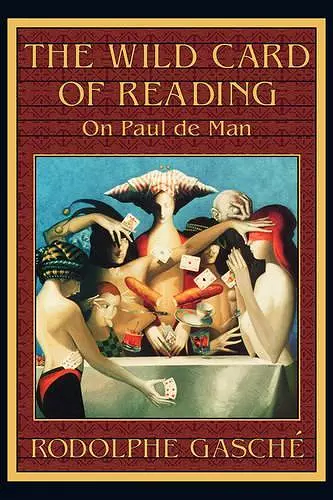The Wild Card of Reading
On Paul de Man
Format:Paperback
Publisher:Harvard University Press
Published:30th Oct '98
Currently unavailable, and unfortunately no date known when it will be back

The Wild Card of Reading is a brilliant book of compelling importance to literary studies. De Man is still one of the major figures in American literary criticism/theory, even if that 'majority' sometimes assumes the form of outright rejection. The major accomplishment of Gasche's book is to have shown for the first time the systematic coherence of de Man's work. This is done in total avoidance of the twin modes of reception that have dominated discussion of de Man's work, namely sectarian partisanship on the one hand and uninformed dismissal on the other. Gasche identifies a stratum of critical engagement with texts in de Man's writing that constitutes what one might call the sphere of his originality and that is irreducible to a set of theoretical tenets. The book elevates discussion of de Man's work to a new level of conceptual richness and precision. It is also a tour de force of lucid exposition. But what I find most appealing about the book is, if I may say so, its intellectual honesty. -- David Wellbery, William Kurrelmeyer Professor of German, Johns Hopkins University
One of the most knowledgeable and provocative explicators of Paul de Man's writings, Rodolphe Gasché, a philosopher by training, demonstrates, for the first time, the systematic coherence of the critic's work, insisting that de Man continues to merit close attention despite his notoriously difficult and obscure style.
One of the most knowledgeable and provocative explicators of Paul de Man's writings, Rodolphe Gasché, a philosopher by training, demonstrates for the first time the systematic coherence of the critic's work, insisting that de Man continues to merit close attention despite his notoriously difficult and obscure style. Gasché shows that de Man's "reading" centers on a dimension of the texts that is irreducible to any possible meaning, a dimension characterized by the "absolutely singular."
Given that de Man and Derrida are both termed deconstructionists, Gasché differentiates between the two by emphasizing Derrida's primary interest in "writing," and postulates that the best way to come to terms with de Man's works is to "read" them athwart the writings of Kant, Fichte, Hegel, Heidegger, and Derrida. He shows his respect for the "immanent logic" of de Man's thought--which he lays out in great detail--while revealing his uneasiness at the oddness of that thought and its consequences.
Gasche has to be applauded for his patient exposition of de Man and his detailed arguments both for and against his theory of reading. Ultimately, this spirited deference of de Man raises many questions about the ethics of theory as the Pinochet affair does about British justice. -- Gary Day * Times Higher Education Supplement [UK] *
In a blend of exposition and commentary, Gasché approaches the compatibility of philosophical aesthetics and literary theory by scrutinizing its relentless conceptualization in the work of de Man. Avoiding a head-on approach to de Man's denial of such compatibility, Gasché tests the validity of de Man's position against both the philosophical tradition and his own argumentation. Though Gasché 'acquits' de Man on both counts, the rebuttal that de Man's writing offers to the second inclines Gasché to assign permanent value to de Man's work: de Man's idiosyncratic thought and unyielding preoccupation with the nature of the literary make him exemplary though not imitable. This clear patient, and precise volume ups the ante in contemporary critical debate. Required reading for faculty and graduate students; Gasché's masterful expository digressions will save upper-division undergraduates from the thickets of terminology. -- O. Krochick * Choice *
If there was anyone to do the job of evaluative recuperation of the contribution of Paul de Man to critical theory it is Rodolphe Gasché. The (perverse) singularity which marks the writing of de Man is carefully analyzed from the viewpoints of Searle and Derrida and the shocking revelations of de Man's Nazi collaboration are set in a frame of reference about critical judgement per se and prejudice against right-wing writing more widely. Gasché's book bridges the gap between the ardent anti- and pro- de Man camps by being stern with the extremes of both positions. * Forum for Modern Language Studies [UK] *
The Wild Card of Reading is a brilliant book of compelling importance to literary studies. De Man is still one of the major figures in American literary criticism/theory, even if that 'majority' sometimes assumes the form of outright rejection. The major accomplishment of Gasché's book is to have shown for the first time the systematic coherence of de Man's work. This is done in total avoidance of the twin modes of reception that have dominated discussion of de Man's work, namely sectarian partisanship on the one hand and uninformed dismissal on the other. Gasché identifies a stratum of critical engagement with texts in de Man's writing that constitutes what one might call the sphere of his originality and that is irreducible to a set of theoretical tenets. The book elevates discussion of de Man's work to a new level of conceptual richness and precision. It is also a tour de force of lucid exposition. But what I find most appealing about the book is, if I may say so, its intellectual honesty. -- David Wellbery, William Kurrelmeyer Professor of German, Johns Hopkins University
ISBN: 9780674952966
Dimensions: unknown
Weight: 408g
610 pages